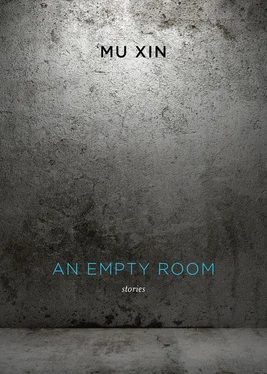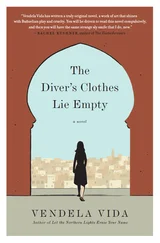Mu Xin - An Empty Room
Здесь есть возможность читать онлайн «Mu Xin - An Empty Room» весь текст электронной книги совершенно бесплатно (целиком полную версию без сокращений). В некоторых случаях можно слушать аудио, скачать через торрент в формате fb2 и присутствует краткое содержание. Год выпуска: 2011, Издательство: New Directions, Жанр: Современная проза, на английском языке. Описание произведения, (предисловие) а так же отзывы посетителей доступны на портале библиотеки ЛибКат.
- Название:An Empty Room
- Автор:
- Издательство:New Directions
- Жанр:
- Год:2011
- ISBN:нет данных
- Рейтинг книги:3 / 5. Голосов: 1
-
Избранное:Добавить в избранное
- Отзывы:
-
Ваша оценка:
- 60
- 1
- 2
- 3
- 4
- 5
An Empty Room: краткое содержание, описание и аннотация
Предлагаем к чтению аннотацию, описание, краткое содержание или предисловие (зависит от того, что написал сам автор книги «An Empty Room»). Если вы не нашли необходимую информацию о книге — напишите в комментариях, мы постараемся отыскать её.
In Our Time
An Empty Room
An Empty Room — читать онлайн бесплатно полную книгу (весь текст) целиком
Ниже представлен текст книги, разбитый по страницам. Система сохранения места последней прочитанной страницы, позволяет с удобством читать онлайн бесплатно книгу «An Empty Room», без необходимости каждый раз заново искать на чём Вы остановились. Поставьте закладку, и сможете в любой момент перейти на страницу, на которой закончили чтение.
Интервал:
Закладка:
Those fleas that had bitten Liang may have also bitten Mei. A poet once compared the blood of a man and a woman mixed within the living walls of a flea to a marriage temple. What a refined sentiment of tragedy! By coincidence my own blood was mixed in as well, though I was innocent. I never witnessed the marriage of Liang and Mei.
I record this story in memory of my youth. And still cannot comprehend what it means — which only demonstrates that I haven’t made much progress these past few decades.
Fong Fong No. 4
fong fong was my niece’s classmate. My niece had mentioned her quite a few times before she introduced her to me. Fong Fong was quite shy. Her frail build was a stark contrast to my niece’s healthy glow but they didn’t seem to mind. There was no need for me to play host with them so they came and went as they pleased and soon Fong Fong was no stranger. I secretly thought of her as one of my piano students. Both she and my niece were quite advanced musicians.
I’m only four years older than my niece — her youngest uncle. Talking with her and Fong Fong wasn’t any different from conversing with my other friends. And despite the gender difference, they dragged me along to shop for dresses and shoes as they respected my opinions in such matters. We casually strolled from store to store, idling away that wondrous phase of life called youth.
Ding Yan was a young man who was a decent pianist, though he made rather slow progress in his lessons with me twice a week. I had long sensed that he was in love with Fong Fong.
The summer came when my niece was admitted to the Central Academy of Music in Beijing. She left Shanghai laughing and crying. Fong Fong wasn’t accepted and stayed behind. She mentioned something about finding a job.
As time passed, Fong Fong still visited often. I didn’t know if this was Ding Yan’s idea or hers. After his lesson, Ding Yan would chat with Fong Fong while I busied myself with little chores.
The next summer Ding Yan was accepted by the Shanghai Academy of Music. I was happy for him. He and Fong Fong would visit together and we’d all listen to music and cook. There were no more piano lessons, just meandering conversations between friends. My niece returned from the north and stayed with me, adding to the lively atmosphere. Who could’ve guessed that Fong Fong actually had no romantic interest in Ding Yan.
“It’s quite simple,” my niece told me. “She doesn’t like him at all. His letters to her are heated. But the more passion he expresses, the more it makes her laugh. She showed me all his letters.”
“Please stop! What are you two laughing at? I think Fong Fong is misleading him. You shouldn’t read those letters anymore. Ding Yan has very fine qualities, though perhaps he isn’t handsome enough for her?”
“Why ask me? I’m not the one receiving the letters.”
“Didn’t the two of you laugh at his slender build? Or poke fun at his thin neck?”
“It’s seems as if you’ve been eavesdropping on us. Fong Fong isn’t the person Ding Yan imagines her to be.”
To be fair I’d say Fong Fong herself wasn’t exactly a stunning beauty. She was a bit too thin with a somewhat plain appearance but did have pretty eyes. It’s possible she thought too highly of herself.
Ding Yan fell ill when he learned about Fong Fong’s complete lack of interest in him. “It was all a dream,” he said to me after recovering. “I bear no grudge nor resentment. It was just my imagination that deceived me.”
I found his words quite noble and praised him. “I may have taught you piano but I could never have taught you this lesson. You’re obviously your own teacher — and no nightingale from the nineteenth century.”
My words brought tears to his eyes. His love was genuine, and unreciprocated for such a long time, reminding me of certain occurrences in my own past.
Whether it was because Fong Fong wanted to avoid Ding Yan or because she was eager to establish her independence, she too moved to Beijing and became a copy editor at a publishing house. Ding Yan rarely stopped by, and my place became lifeless. Others visited but it wasn’t the same.
Fong Fong often wrote me letters on elegant paper sealed in matching envelopes. There was a graceful flow in her handwriting and a cleverness in her choice of words — cleverness because her deliberate turns in idioms and phrases formed elusive images and a charming uncertainty in meaning. If you had never met her before, from her letters you’d think she was an eloquent and refined woman. It’s also possible that if her words weren’t written in such fine calligraphy, her letters might not have seemed as graceful. When did she start practicing calligraphy anyway? This practice seemed quite incompatible with her person — her slightly rigid manners and her relatively common speech. And yet she was a gifted letter writer. In my replies, I tried to be playful and imitate her style of mixing archaic and contemporary diction. Fortunately, I didn’t have to worry about “love” as I believed in love at first sight. Without this initial spark of love, you could see the person every day and still not feel anything. Ding Yan asked about Fong Fong and I showed him her letters. He was also impressed with her calligraphy.
Our correspondence, or rather our word games, became a regular ritual. Then one autumn I was invited to Beijing to sit on a judging panel for a piano competition. I wrote to my niece and Fong Fong, not expecting that they would ask me to purchase some winter and spring clothes for them. Besides being a little awkward for a man to buy women’s clothes, they didn’t even tell me their sizes. So I made my best guess and purchased a few things.
After they tried on the clothes, they were, to my surprise, quite happy with my selections. “But please spare me such responsibilities in the future,” I said.
My job as a judge was easy enough, nodding when everyone else voiced praise and nodding again when they criticized. None of my students were part of the competition so I could afford to be relaxed. Still, somehow word spread that I was fair, mature, and even showed depth as a judge. Nobody, though, knew how my niece, Fong Fong, and I played on the swings and slides in Tao-Ren-Ting Children’s Park, or how, afterward, we competed to see who could eat the most dumplings and how I emerged the winner. Nobody saw our childlike innocence.
All the other memories of my visit to the capital that year are now vague. What I do distinctly remember is receiving a letter from Fong Fong at my hotel, though of course we were both in Beijing. In the letter she wrote, among other things, “You looked so handsome in that leather hat yesterday!”
I didn’t particularly appreciate her flattering tone of voice, so I wore a different hat the next time we met.
After I returned home, our correspondence gradually became less frequent. Her letters then began to arrive from Anhui Province where she had been sent to do farm work. The playful naughtiness in her lines vanished. Occasionally, she would include phrases such as “years pass by like a river. . alas, the flower-like beauty of women. .” I didn’t laugh, as I, too, needed to work extremely hard just to put food on the table, leaving me with no leisurely feelings. Things continued in this way and two more years disappeared.
As Fong Fong’s family lived in Shanghai, her trip home for Spring Festival was already long overdue. Then she suddenly showed up at my place one afternoon and announced that she had been home for more than a week. I was astonished — it was as if she had changed into another person. While we caught up, I secretly studied the new fullness of her body: her skin was a light tan suffused in pink; a touch of rural resilience complemented her fragile build; her manners were no longer rigid; her body revealed the curves of a country girl. The years of farm work must have shaped her figure, plus nature, home cooking, and whatever else added to a belated youthfulness. Her eyes, already her most striking aspect, now cast vivacious glances that brightened her whole face. This was without a doubt a very attractive woman. I began to feel a different kind of harmony between us, as if we were both more sophisticated. Her speech was more fluent, more akin to her flowing calligraphy.
Читать дальшеИнтервал:
Закладка:
Похожие книги на «An Empty Room»
Представляем Вашему вниманию похожие книги на «An Empty Room» списком для выбора. Мы отобрали схожую по названию и смыслу литературу в надежде предоставить читателям больше вариантов отыскать новые, интересные, ещё непрочитанные произведения.
Обсуждение, отзывы о книге «An Empty Room» и просто собственные мнения читателей. Оставьте ваши комментарии, напишите, что Вы думаете о произведении, его смысле или главных героях. Укажите что конкретно понравилось, а что нет, и почему Вы так считаете.












